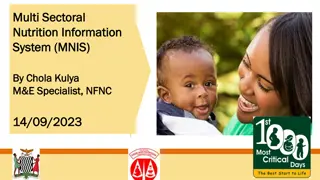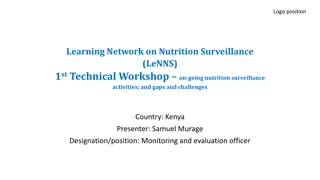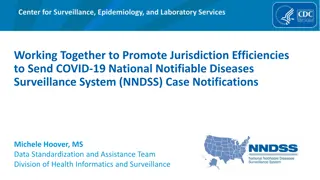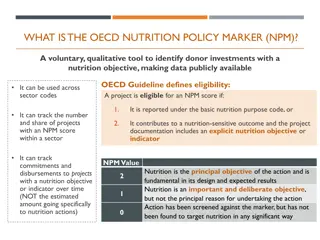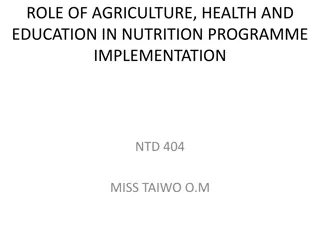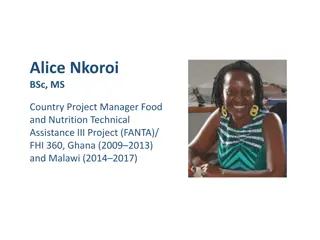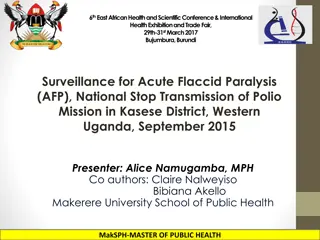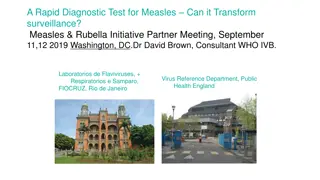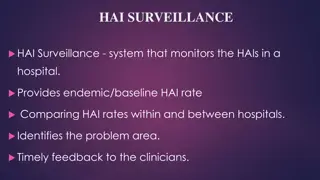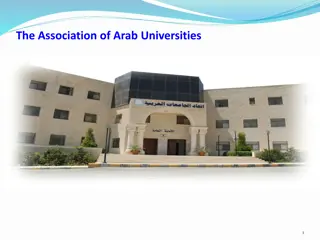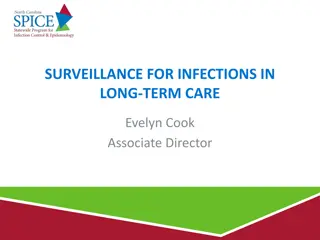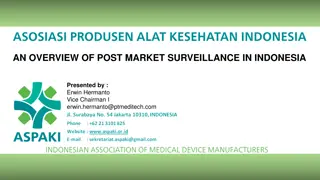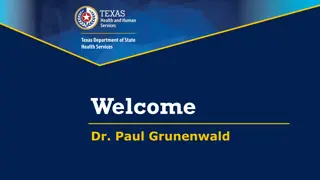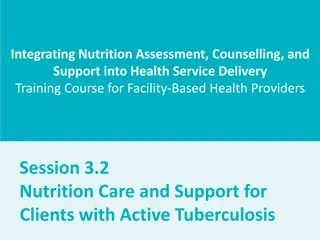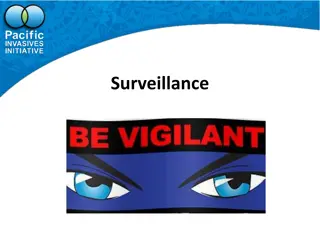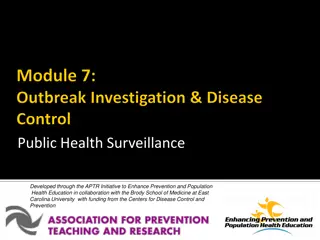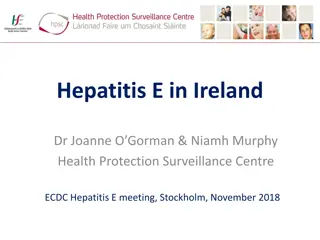Role of Universities in Nutrition Surveillance: Insights from LeNNS Workshop
Zione Kalumikiza Chikumbu, a public health nutrition lecturer at Lilongwe University of Agriculture & Natural Resources, presents key findings on under-5 nutrition, micronutrient deficiencies, feeding practices, and previous surveillance efforts in Malawi. The workshop highlights the importance of university involvement in monitoring and addressing nutrition challenges.
Download Presentation

Please find below an Image/Link to download the presentation.
The content on the website is provided AS IS for your information and personal use only. It may not be sold, licensed, or shared on other websites without obtaining consent from the author. Download presentation by click this link. If you encounter any issues during the download, it is possible that the publisher has removed the file from their server.
E N D
Presentation Transcript
Learning Network on Nutrition Learning Network on Nutrition Surveillance ( Surveillance (LeNNS LeNNS) ) 1st Technical Workshop Role of Universities in Nutrition Surveillance Zione Kalumikiza Chikumbu Lecturer in Public Health Nutrition Department of Human Nutrition & Health Lilongwe University of Agriculture & Natural Resources
Country context under 5 nutrition 60 NUTRITION @ LUANAR 55 55 53 50 Percentage of Underfive children 47 40 37 35.5 30 24 20 20 17 13 12.8 12 10 9 7 8 8 6 6 5 4.4 4 3 2.6 0 1992 2000 2004 2010 2016 2020 (MICS) 2 2 Stunting Wasting Underweight Overweight LeNNS 1st Technical Workshop Zione Kalumikiza Chikumbu
Frequent feeding but poor quality NUTRITION @ LUANAR Breastfed Non-breastfed All children 6-23 months 31 30 29 25 24 19 Percent 9 8 4 Minimum Meal Frequency Minimum Dietary Diversity Minimum Acceptable Diet 3 3 Sources: NSO (2017) LeNNS 1st Technical Workshop Zione Kalumikiza Chikumbu
Micronutrient deficiencies NUTRITION @ LUANAR 4 4 LeNNS 1st Technical Workshop Zione Kalumikiza Chikumbu
Overweight & Obesity NUTRITION @ LUANAR 5 5 LeNNS 1st Technical Workshop Zione Kalumikiza Chikumbu
Previous surveillance efforts the INFSS NUTRITION @ LUANAR Set up following Malawi s severe 2001/2 famine (May 2013) Technical assistance from Action Against Hunger (AAF) Support of the Malawi Government, UNICEF, European Union, other partners Initially piloted in six districts, then covered entire country Aimed to provide information on nutrition trends of children u 5 & household food security AAF handed the program over to the Malawi Government in 2008 Program was discontinued and no national programme since Ministry of Agriculture has surveillance in its structure but not operational 6 6 LeNNS 1st Technical Workshop Zione Kalumikiza Chikumbu
Surveillance features in the national agenda NUTRITION @ LUANAR 1 of 8 policy priority areas Research areas included in the national research agenda NNIS routine system 7 7 LeNNS 1st Technical Workshop Zione Kalumikiza Chikumbu
About LUANAR NUTRITION @ LUANAR Located in Lilongwe, central Malawi Established through Act of Parliament No. 22 of 2011 Emanated from Bunda College of Agriculture, then a constituent college of the University of Malawi since 1967 Operational from 1st July 2012 Faculty of Food and Human Sciences became operational in July 2013 comprising Departments of (i) Food Science and Technology; (ii) Human Nutrition and Health; (iii) Human Ecology 8 8 LeNNS 1st Technical Workshop Zione Kalumikiza Chikumbu
Nutrition and nutrition-related data/information generated NUTRITION @ LUANAR Types of data sets generated or, involvement in surveys/data generation mechanisms Frequency of generation [if had-hoc, routine, or upon request, mention those generated in the last 2 years] Users of the data MVAC SMART Surveys (includes IYCF and adolescent nutrition indicators) 7 rounds to date since 2015 (initially planned for twice/year then reviewed to lean season); Upon Request Nutrition Cluster (Government and development partners) Partner projects UNICEF/KfW funded Stunting Reduction project assessments Upon requests Conducted baseline, midline, endline over 5 years Government (concerned districts), UNICEF and its partners) Several on-going national level efforts: EmA-FSS, DHIS, MVAC comprehensive food security surveys, routine national surveys (DHS, MICS, IHS,NMS), CMAM data 9 9 LeNNS 1st Technical Workshop Zione Kalumikiza Chikumbu
Previous surveillance related efforts NUTRITION @ LUANAR Surveillance of Micronutrient Programmes Study Followed the 2001 Hunger & NMNS report UNICEF funded 2 rounds were planned but never continued largely situation analyses 2 publications (site & life; bunda journal IDD sentinel surveillance led by CHSU with support from UNICEF Between 2011 and 2013 LQAS surveys & bottleneck analysis After roll out of SUN in 2 districts 10 10 LeNNS 1st Technical Workshop Zione Kalumikiza Chikumbu
Mechanisms and platforms for disseminating nutrition data generated NUTRITION @ LUANAR Information/data sharing in country Selected groups: Nutrition cluster group, policy advisory team Nutrition platforms: National nutrition coordinating committee, SUN learning forum Online/websites Specific clients and concerned districts (for project level data) Information sharing with the rest of the world Publications, Conferences, Webinars Role in data sharing mechanisms Presenter/ part of a collaborative team User 11 11 LeNNS 1st Technical Workshop Zione Kalumikiza Chikumbu
Challenges and gaps in data generation NUTRITION @ LUANAR Lack of a comprehensive national surveillance programme (besides routine surveys) Huge costs for data collection in the absence of a routine system Current surveillance efforts not coordinated/disaggregated (silos) Emergency or project focus Existing data limited in scope of indicators (little on food security, NCD etc) No (operational) online surveillance platform for users of data NNIS set up but not fully operational Project level - MAPSaims to develop an online platform (on micronutrient supplies) surveillance data would be a great input to such policy tools 12 12 LeNNS 1st Technical Workshop Zione Kalumikiza Chikumbu
Planned research/data/information generation in the next 5-10 years NUTRITION @ LUANAR Research/data/information generation in the next 5-10 years Nutrition Research Agenda (under review) National level surveys : DHS, NMS, MICS, IHS National Nutrition Information System coordinated by Government (DNHA) MAPS: On-going analyses of existing national datasets to estimate nutrient supplies/deficiencies and make projections Innovative approaches to data generation introduced in Malawi Methods: SMART methodology for MVAC nutrition surveys & LQAS surveys; Use of tablets (versus paper-based systems); Geomapping attaching location/space to existing challenges, modelling & projections (MAPS); Adaptations e.g. Family MUAC 13 13 LeNNS 1st Technical Workshop Zione Kalumikiza Chikumbu
Where do we see our role? NUTRITION @ LUANAR Capacity building Data collection using standardized protocols Data quality Teaching (integration) Leading in choice of indicators Database hosting (bid data science) Generating and pursuing research questions to generate evidence Piloting solutions/innovative approaches 14 14 LeNNS 1st Technical Workshop Zione Kalumikiza Chikumbu
How can the role of universities be enhanced? NUTRITION @ LUANAR i. Creating surveillance units/thematic groups within relevant departments, with a clear mandate ii. Creating horizontal and vertical linkages between the University units & data centres in Government & various institutes (under carefully crafted agreements) iii. Utilise linkages (ii) to create research questions and respond to them using existing data i. Government MDAs, civil society and DPs can request Universities to answer specific questions using surveillance data. iv. Giving universities capacity building roles in various facets of surveillance processes/data. v. Including relevant experts from universities in surveillance decision making entities vi. Supporting continuous development and learning on the topic 15 15 LeNNS 1st Technical Workshop Zione Kalumikiza Chikumbu
Finally.. NUTRITION @ LUANAR Mechanisms & platforms for translating research findings into policies and programmes Policy briefs Policy dialogues (multi-sectoral) Strategic media engagements Strategic partnerships with civil society for advocacy Support for scientific publications sometimes, policy is driven from outside Science communication in ways that appeal to the target audience 16 16 LeNNS 1st Technical Workshop Zione Kalumikiza Chikumbu









